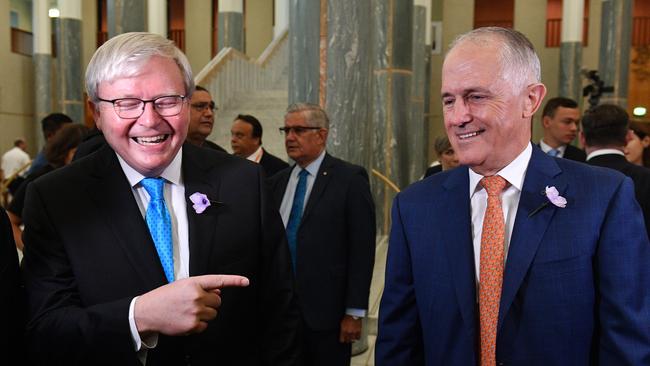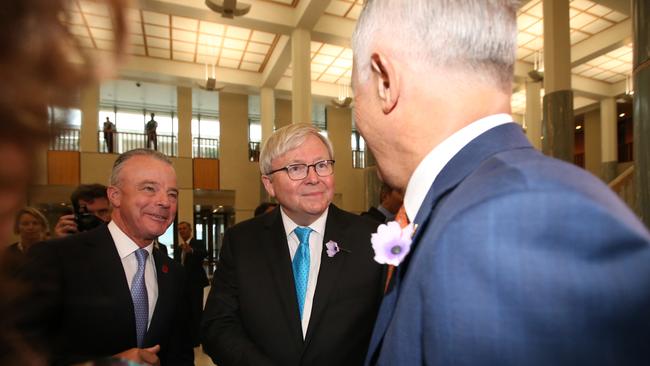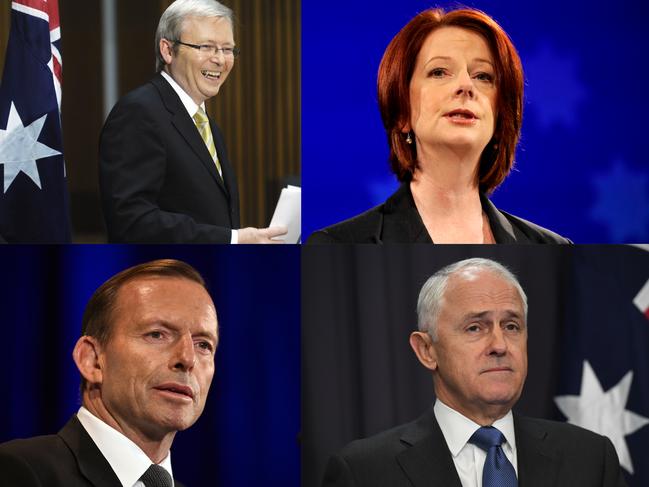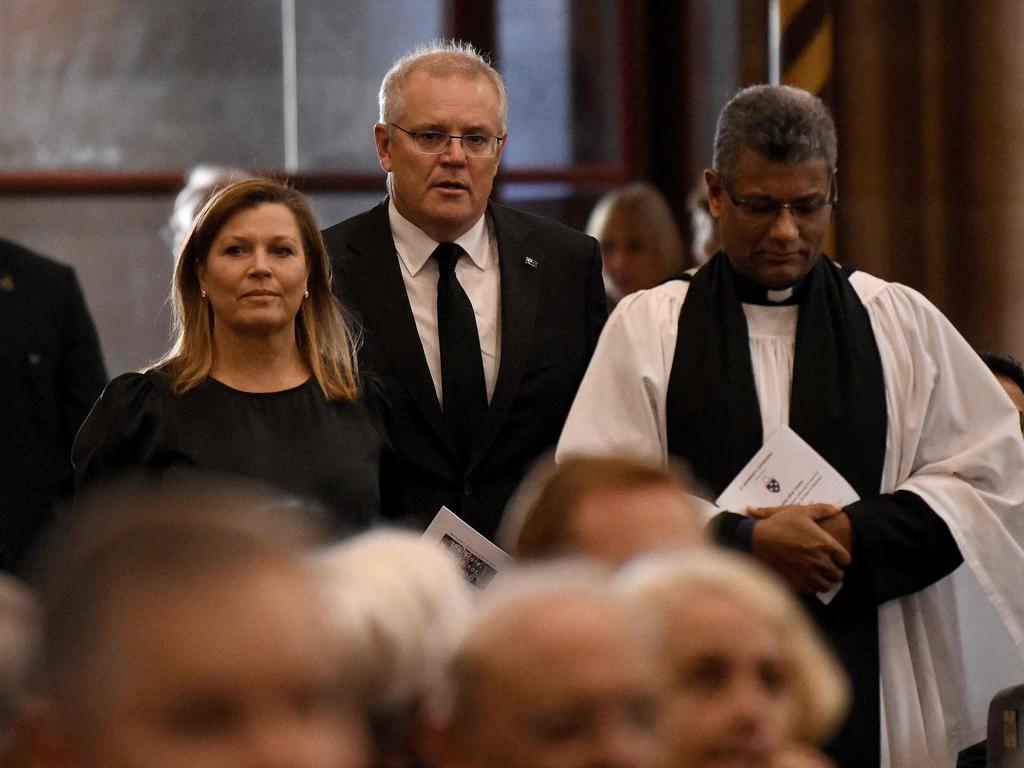Political opposites, Kevin Rudd and Malcolm Turnbull are uncannily alike
Kevin Rudd and Malcolm Turnbull may be the most fascinating pair of ex-PMs in our history. How pitiful, then, that they are both so embittered.

Almost a year earlier I had moved from Adelaide to take the Sydney-based job, which was never going to be easy given Turnbull was up against a freshly elected and wildly popular Kevin Rudd. But by late November it was clear to both of us that he was not going to see the year out.
“It is all right for you,” I half-joked, “you can go back to making money. But there won’t be many options for me, I might have to write a scintillating book about my year of living dangerously.”
“Oh, it’s been OK for you,” Turnbull corrected me, “at least it got you to Sydney.” He was right; I still live in his old electorate, within foghorn range of the harbour.
Turnbull is a complex man who can be disarmingly charming one minute and brutally critical the next. At times you almost might convince yourself that his success comes more from rote learning than insight, his gravitas enhanced mainly by that beautifully powerful voice, but then he will cut through with an unseen angle or a telling detail.
He is not always the smartest person in the room; but more often than not. He also has a habit of going directly to the source of new information or expertise, learning personally from the best brains on any subject. (His smartphone contact list should be sought as a prize exhibit for the National Library.)
Ideally, politicians should not be mercurial; stability and calm are crucial. Those who succeed best are almost robotically even-tempered.
They need to have the cool calculation to make national security committee decisions about troop deployments, the pastoral empathy to comfort grieving families in disasters, and the fortitude to stare down bitter personal attacks. And they might need all those attributes in one day, before facing new assaults in the morning.

Living with this pressure, politicians must remain on top of every brief and project calm. Any error could be career-ending, any sign of temper or frustration just as bad — and all the while they must make the right decisions and perform their normal duties competently.
Turnbull and Rudd are brilliant and talented men, but they fell short on this prescription — almost everyone would. Indeed, during the past three decades only John Howard and Bob Hawke truly made this superhuman grade.
When Turnbull lost the leadership and decided to leave politics, I was one of those who advised him to stay. He called while I was drinking with friends at Kings Cross — I was bit over politics — and I suggested he had enough money and had nothing to prove in business, but that if he stayed on under Tony Abbott he almost certainly would get to serve as a senior minister, and who knows what could happen from there?
Just more than five years later, when Turnbull tore down Abbott to take the prime ministership, I found it distasteful but tempered my commentary by saying only that it was unnecessary (because Abbott could have won re-election) and that now it was done, Turnbull needed to make it work. He did not.
Turnbull’s ambition had driven him to replicate the reckless entitlement displayed by Labor under Rudd and Julia Gillard. The price of his prime ministership was to eliminate a key difference in political maturity between the Coalition and Labor — elevating personal politicking over good governance.
Then, as Turnbull struggled to capitalise on his own coup and the public goodwill that coupled his ascension, his similarities with Rudd became increasingly obvious. The same volatile characteristics, the alternating charm and viciousness with colleagues, grandstanding on climate but failure to deliver, desire for public adulation but inability to consolidate internal support, and the triumph of hope over achievement.
Other crucial figures contributed to this turbulent period, to be sure — a ruthlessly ambitious Gillard, a headstrong Abbott, plotters such as Bill Shorten and Christopher Pyne, events such as the global financial crisis and the Copenhagen climate talks — but, amid all this, Rudd and Turnbull loomed large. In almost a quarter of a century from 1983 to 2007 Australia was led by only three prime ministers; in the Rudd-Turnbull era we saw six changes of prime minister in only 11 years.
Since Rudd was elected, no prime minister has served from one election to even contest the next. In that period, extraordinarily, Rudd and Turnbull each led their parties twice and each was twice dethroned.
They are compelling characters. Their life stories follow a similar narrative and, uncannily, in their post political lives they have behaved in an identical fashion.
Both have bases in New York City, both have returned to their climate-change advocacy, are prominent on social media, published memoirs, remain vengeful towards their former colleagues and have united in a common cause against News Corp (publisher of The Weekend Australian). They both seek to blame this expansive media organisation for their political demises.
With several colleagues, I observed the obvious similarities between these rivals when I worked for Turnbull. Discussing the parallels with political and media contacts across many years, including with Sky News chief executive Paul Whittaker, for whom I had worked previously when he was editor-in-chief of this newspaper, it became obvious that this would make for a fascinating documentary.
When Rudd and Turnbull joined forces in post-political campaigns on climate, energy, and media it provided the final piece in the puzzle of their parallel narratives.
One pivotal moment in their intertwined political careers occurred over climate policy. It was seminal to all that has followed, for both men and the country, and it has been largely overlooked. I was present for this instructive, sliding-doors moment, so this documentary was the perfect chance to explore it.
Rudd’s carbon pollution reduction scheme (the Orwellian name he gave his landmark emissions trading scheme) was before parliament in late 2009 and Turnbull had made a captain’s call, declaring the Coalition would pass the scheme if suitable amendments could be made. So, for many weeks, Rudd government ministers and bureaucrats haggled with Turnbull’s frontbenchers and advisers over details.
All the while, resistance from conservative MPs was gathering, with leaders such as senator Nick Minchin going public with their opposition to climate action. Turnbull knew he needed to get a deal done quickly or face an internal lynching so, at his behest, I approached Rudd’s chief of staff suggesting a meeting — the prime minister and opposition leader could find a path within a few hours to deliver the CPRS.
Rudd refused. Rather than seize a historic policy achievement to tackle what he called the “greatest moral challenge” of our time, the prime minister sought to maximise the opposition leader’s pain.

On one level it was lethal politics — Turnbull soon was taken down by Abbott — but it was a Pyrrhic victory. Rudd gained Abbott as a brutal opponent, the Copenhagen climate talks failed, Rudd’s CPRS was blocked in the Senate and when he retreated, ducking a double dissolution and dropping his signature policy promise, the public and his party saw that he stood for little. By overplaying his hand, Rudd delivered a termination trifecta; he had killed off Turnbull, his CPRS and himself. Since then, no accommodation on this policy has emerged and nothing is likely to succeed without bipartisan support.
Still, the most incredible aspects of the Rudd and Turnbull stories were yet to come and, again, they played out in mirror images. Against all the odds, both of these men returned, reclaimed their party leaderships and the prime ministership.
As ABC broadcaster Tom Switzer says in the documentary, these are political comebacks to rival the greatest in the democratic world. Yet, despite all this, Rudd and Turnbull remain embittered. Neither can accept their own failings and they have both found the same scapegoat — others, and News Corp in particular.
Both men are in their 60s, seemingly in good health, wealthy and active. They already are in the running to emerge as the most fascinating pair of ex-prime ministers in our history — their story rivalled only by the rapprochement between Gough Whitlam and Malcolm Fraser — and they have hardly begun.
No doubt there are times each of them has been treated unfairly by News Corp journalists or commentators; unfair criticism is a constant pitfall in political life. But they both received mainly straight reporting, as well as plenty of encouragement, and even barracking, from the News Corp stable too.
The idea of some sinister conspiracy against them is silly, undone by the reality of contemporaneous reporting, their own failures, the moves of their colleagues against them and the public verdicts through the ballot box. It is a sad and obvious fact that, aside from some commercial radio, there is precious little political criticism from a mainstream right-of-centre viewpoint in this country except from News Corp.
Most of our media drifts from green left to hard left, dominated by the publicly funded broadcasters, and without News Corp, the liberal left would hardly be critiqued. This seems to be what people like Rudd and Turnbull want. As if to prove the point, Turnbull went out of his way to make this situation worse by instigating the establishment of The Guardian Australia — and this week he and Rudd co-authored a piece in that publication attacking the Coalition’s climate stance.
For about eight years from early 2011 to late 2018 I wrote most of the political editorials for this newspaper. Believe me, I could tell you the paper’s position on every issue. A cursory examination would turn up editorials calling on Abbott to appoint Turnbull as his treasurer, then, after the coup, urging a successful reform agenda for Turnbull, and backing a Turnbull election victory.
My own commentary always sought to proffer advice to Turnbull, alerting audiences to my connection, and trying to point out mistakes and looming dilemmas.
My harshest criticism was for his kneejerk rejection of the Indigenous voice — hardly a cause celebre of the hard right — and I warned him months earlier, and again a fortnight out, that his climate and energy policy could cost him the leadership a second time.
As for Rudd, I was then foreign minister Alexander Downer’s chief of staff during the 2007 election campaign. On the back of his Australian Wheat Board campaign, run largely through the pages of The Australian, and his claims to economic conservatism, Rudd won this newspaper’s clear endorsement — one that Rudd’s former close friend, then editor-in-chief Chris Mitchell, now regrets. But whatever else he might say, Rudd cannot deny that this newspaper gave him a red-hot go.
Still, there is no need to get into the weeds on this stuff, the point is quite plain — media players do not decide elections, voters do, and media players do not decide party leadership, that is in the hands of the elected MPs (now broadened to the party membership on the ALP side). Unfortunately for them, Rudd and Turnbull both found a way to waste terrific public support and turn their own MPs against them — another telling shared trait.
In Rudd’s case, for instance, blaming the media seems fanciful when we consider what his own colleagues said about him at the time. “Kevin Rudd had contempt for the cabinet, contempt for the cabinet members, contempt for the caucus, contempt for the parliament,” communications minister Stephen Conroy said in 2012. “And ultimately what brought him down a year or two ago was the Australian public worked out that he had contempt for them as well.”
Or, a year later, former health minister Nicola Roxon: “Removing Kevin was an act of political bastardry, for sure, but this act of political bastardry was made possible only because Kevin had been such a bastard himself to too many people already.”
To be sure, these are both brilliant men. That is what makes the tale of their crisscrossing paths so compelling.
Neither was given their stellar pre-politics careers. Rudd was closer to poverty and lost his dad as a young boy, Turnbull lived more comfortably but knew abandonment from his mother.
Their single-mindedness as boys and teenagers, excelling as they struck their own paths, is the stuff of hard-fought and driven destiny. Both married strong and successful women.
Rudd, the dynamic diplomat and state bureaucratic enforcer, and Turnbull, the high-profile barrister and successful businessmen, arrived in federal politics with high expectations, but still with mountains to climb.
Rudd led his party within eight years and was prime minister within nine. Turnbull was in cabinet before the end of his first term, led the Liberals within four years and, despite losing the leadership, won it back and was prime minister 11 years after entering parliament.
Rudd and Turnbull were in federal politics for the relatively modest periods of 14 and 15 years respectively and in that time each managed to win the leadership of their party, lose it, and win it back, each serving as prime minister into the bargain. Determination must run deep.
When we approached Rudd for a documentary interview, he tweeted a letter in response referring to Sky News as the most “aggressive tumour” in Murdoch’s “cancer on our democracy” and calling me a “conservative hatchet man”. We took it as a no.
For his part, Turnbull responded via Twitter, referring to the request for an interview as “standard gangster tactics”. He has subsequently popped up regularly on the ABC and CNN, where the questioning resembles a protection racket.
This is all a little pitiful. The tit for tat of the insiders’ game — hardly of interest to anyone outside the twittersphere.
The public might be interested in revealing interviews with these men, but in the meantime I hope they find our documentary compelling. It traces an extraordinary tale of men who mapped similar paths, enjoyed stellar success and ultimately failed in the same way.
It dares ask questions about how this pair might use their talents for better outcomes in the future. And whether we ought to make better use of our former prime ministers.
Men In The Mirror: Rudd & Turnbull premieres on Sunday May 2 at 8pm AEST on Sky News on Foxtel.





When I served as opposition leader Malcolm Turnbull’s chief of staff in 2009 there was little to laugh about, but he made one penetrating quip as we shared a moment of gallows humour. We were having a whine and a wine late at night in Parliament House, despondent about the gathering leadership storm.